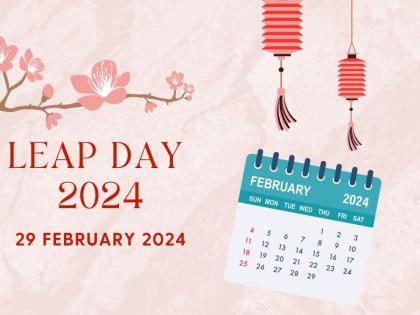Leap Day 2024: Exploring the Facts, History, and Significance of February 29th
By Lokmat English Desk | Published: February 29, 2024 07:18 AM2024-02-29T07:18:20+5:302024-02-29T07:19:50+5:30
Leap Day, occurring approximately every four years, is an additional day inserted into the Gregorian calendar. This tradition traces ...

Leap Day 2024: Exploring the Facts, History, and Significance of February 29th
Leap Day, occurring approximately every four years, is an additional day inserted into the Gregorian calendar. This tradition traces back to 46 BCE in the Julian calendar, introduced to compensate for the Earth's slightly longer orbit around the Sun, which exceeds 365 days. The Julian calendar's absence of this additional day caused seasonal discrepancies, with the start of each season shifting by about a quarter of a day annually.
LeapYear Marriage: The tradition of women proposing marriage to men on Leap Day has its roots in Irish folklore. According to legend, St. Bridget, an Irish nun, complained to St. Patrick about the long wait for women to receive marriage proposals. In response, St. Patrick designated 29 February as a day when women could take the initiative and propose to men. This tradition has since spread to other cultures and is celebrated in various ways around the world.
This phenomenon of Leap Day carries significant historical and practical implications. By appending an extra day to February, our modern Gregorian calendar aligns more accurately with the Earth's solar revolutions. In this piece, we explore the origins of Leap Day, its pivotal role in calendar precision, and captivating anecdotes associated with this remarkable occasion.
LeapDayDate
Leap Day is observed on 29 February after every four years. This year, it falls on Thursday.
LeapDayInterestingFacts
Rare Birthdays: People born on 29 February are known as 'leaplings' and celebrate their birthdays only once every four years. This makes them part of an exclusive group, with an estimated probability of being born on Leap Day of about 1 in 1,461.
Traditions and Superstitions: Leap Day has inspired various traditions and superstitions around the world. In Ireland, for instance, it is believed that women can propose marriage to men on this day, reversing traditional gender roles, the tradition is called 'Ladies Privilege'. In some cultures, Leap Day is associated with good luck and fortune, while in others it is considered an unlucky day for certain activities. In Greece, Leap Day is considered bad luck and people avoid marriages on this day. In the United States, the town of Anthony, Texas, is known as the 'Leap Year Capital of the World' because it celebrates Leap Day and the people born on that day.
Legal Status: In some legal systems, such as English law, a person's official birthday on 29 February is considered to be 1st March in non-leap years. This legal distinction ensures that individuals born on Leap Day have a consistent birthday date for administrative purposes
Open in app